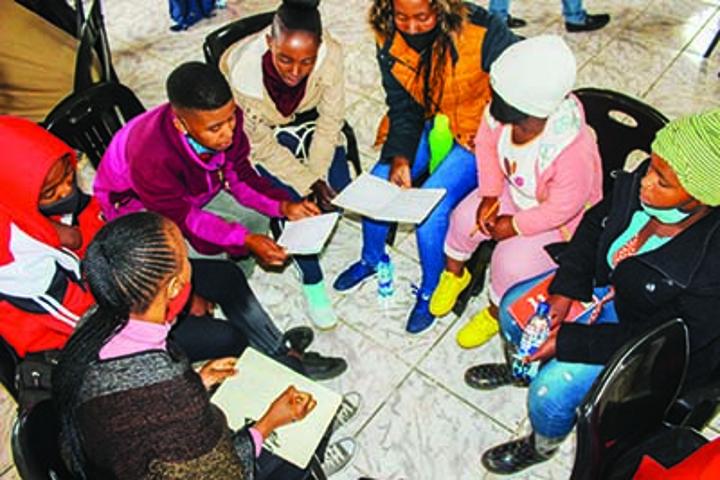Africa-Press – Lesotho. As part of the intervention strategy, the Lesotho Planned Parenthood Association (LPPA) said there will be more community based engagements which are aimed at arresting the challenges in the Mokhotlong district.
It is alleged that the high HIV prevalence, child marriages, teenage pregnancies, transactional sex, and intergenerational sex among other challenges have reached alarming proportions that
have been necessitated by the presence of the ongoing big projects in the district. LPPA initiated the community dialogue in concert with the district AIDS Commission and the District Administrator’s (DA)
office and the key stakeholders who participated at the meetings were the youth, parents, councillors, chiefs, the representatives from the Lesotho Highlands Development Authority (LHDA) and the Ministry of Health (MoH).
The LPPA’s #BecauseWeCan Project Coordinator Tlali Matela said the purpose of the discussions is to learn firsthand the challenges that have rocked the district and how to address them
in the long run. Matela said the other purpose of the community discussions is to establish the situation on sex and family planning, the education of the children
and how it is affected by the alleged challenges and state of health services on whether they are still reasonably accessible to all and if there are challenges around their access and how can they be remedied.
‘How do we protect the girl child in this environment and how do we protect the pregnant women?” he asked. The
residents said the high teenage pregnancy prevalence is caused by unprotected sex and the HIV infections multiple – concurrent partners. The girls were said to be most
vulnerable to unprotected sex as they are enticed into sex by the bigger partners and they have lesser bargaining power to negotiate condom usage. It was also established that the parents who ‘abdicate’ their financial
responsibilities to their children living in the blocks of rental units and when they run out of money they explore ‘means’ to get it to meet their needs.
The discussions also brought to the fore the myths which purports that old people ‘know better’ than the children and they want unprotected sex to the ‘ignorance’ of the young girls who could be
oblivion to its consequences. The youth also professed ignorance over sexual issues saying that they lack sex education and therefore less empowered on matters related to intercourse.
Some of the reasons for child marriages the young mothers said is due to poverty, peer pressure and pressure from the parents whom they allege would push them to go and ‘work’.
The male youth on the other hand indicated that the child marriages are a result of ‘poor’ parenting skills adding that some parents fail to reprimand their children for ‘fear’ of losing
connection. The out of schools youth are also said to be vulnerable to early child marriage. Also the gender based violence was attributed to both child
marriages and accounts to high rate of HIV/AIDS infections. These transpired during the two days session on Wednesday and Thursday last week at Mapholaneng, Mokhotlong.
The youth said that they need to be equipped with tools of trade on how to improve their lives and lead a brighter future as they earn for financial independence.
Commenting on the emotionally charged engagements, Matela expressed confidence on the participants’ contributions saying the inputs were valuable and could inform the policies which could favour
them. Lesotho is said to be among the top 10 countries in the Southern Africa Development Community (SADC) region with high prevalence of HIV/AIDS. The
Lesotho Demographic and Health Survey 2014 (LDHS) report established that new HIV infections among adolescent girls and young women are very high, with the girls at 29.3 percent and the
boys at 10.9 percent. In 2015, Lesotho featured as the second highest prevalence of HIV in Southern Africa, after Eswatini at 22.7%. Despite the report showing that young
men are four times more likely to have multiple sexual partners than their women peers, young women are reported to be twice more likely to know their HIV
status than men. The results of the study revealed that the women median age at first intercourse is 18.5 years and 6% is reported to engage in sex before age 15,
of which 42% of women have sex before age 18 and by age 20, 72% have had sexual intercourse whether married or unmarried. Also, on men the median age at first
intercourse experience is 18.1 years of which 12% have had sex before age 15 and the 49% have sex before 18 years. At 20 years, 70% have had sexual intercourse married or unmarried.
It also showed that by age disparity on sexual relationships it was more prevalent among teenage girls. The report found that in Mokhotlong there were many instances of teenage pregnancy than early child marriages who
were still at secondary schools. It says 24 percent of teenage who are at the ages between 15 – 19 were pregnant. While the big projects are praised for
bringing socio-economic benefits, improved access to services through their corporate social responsibilities initiatives, create employment in host communities amongst other benefits to the host communities, there are
allegations that their presence could be attributed to the high teenage pregnancy which leads to school drop-out in many instances, early child marriages, intergeneration sex, transactional sex, high prevalence of Sexually
Transmitted Infections (STIs) and the HIV/AIDS prevalence in the such communities. The LDHS report says teenagers who live in rural areas are more likely to have children than their urban based peers.
It continues to state that about 23 percent of rural teenagers have had a live birth and or are expecting compared with 12percent of those living in urban
areas. The February 2018, Situational analysis on early and unintended pregnancy in Eastern and Southern Africa report states thus: “Early and unintended pregnancy (EUP)
is a global public health concern. Extremely prevalent in sub-Saharan Africa, it is driven by multiple factors, including poverty, lack of information and
access to reproductive health services, cultural norms, peer pressure, and sexual coercion and abuse. Among other negative consequences for adolescent
girls, including for their health, social, and economic outcomes, EUP jeopardizes educational attainment due to school dropout and decreased school completion.
“Preventing EUP is therefore an important component of a wider response to ensuring the right to education for
all girls, requiring an effective response from the education sector in collaboration with other sectors. Concern for sexual and reproductive health and rights (SRHR) and EUP has been widely expressed throughout the Eastern and
Southern African (ESA) region by governments, United Nations (UN) agencies and the non-governmental organization (NGO) sector. ” The report also highlighted the ‘taboo’
which is associated with talking about sexual related issues with their children. On one hand, the report says in 2014 Lesotho was sitting at 19.1 percent with ‘early childbearing’ ages between 15
to 19 years on young women with the first pregnancy. On the other hand, it says that the country recorded 56.0 percent rate of unintended pregnancies by the
same age group. It also took stock of the stigma and discrimination associated with the unintended teenage pregnancies at schools, clinics and families, adding that it could lead to girls resorting to unsafe
abortions in other to get rid of their pregnancies. To address the challenge of early child marriages and unintended teenage pregnancies, the Ministry of Education and
Training (MoET) has introduced comprehensive sex education at primary level through subjects such as Life Skills and Sexuality Education. Such courses are envisaged
to empower teenagers and adolescents with knowledge on their bodily changes and to take well informed decisions about their bodies. The youth had cited lack of
comprehensive sex education as the cause for unintended teenage pregnancies and early childhood marriages. They had also said the latter could be as a result
of unfavourable economic conditions which they escape by entering into marriages at young ages. The United Nations (UN) 2015 made startling revelations to the effect that one out of five girls are married before they
reach 18 years. Meanwhile, Her Majesty Queen ‘Masenate Mohato Seeiso has urged the nation to bring an end against an early child marriages. She has also appealed for the empowerment and education of a boy
child. In 2018 during the first sitting of the National Children’s Parliament, Princess Senate Mohato Seeiso said the early child marriages rob children of
their childhood and brighter future prospects. Addressing some of the concerns and allegations raised by the residents of Mokhotlong during the fora about the
ongoing Polihali Project, the Polihali Project Manager Gerard Mokone said the baseline studies were undertaken in 2015 to establish about the state of
essential health services and socio-economic conditions in that district. He said these studies established that the district was ‘leading’ with high HIV/AIDS prevalence, early childhood marriages among other social
challenges. Mokone said those studies have informed the Public Health Action Plan which is expected to be implemented to address some of these challenges.
Asked when the report will be implemented, he said he believes it will see the light of the day in this upcoming financial year once it receives the approval.
He also told the residents that they have mounted a strong institutional culture within the project wherein the discipline and code of conduct are inculcated on daily basis to the workers
through what he said are the ‘tool box talk’. “How do we join hands to stop these from continuing?” he asked. The Polihali Project Manager further said they have tightened the access measures to their sites wherein access will
be by granted permission into their premises. This is to react to the allegations that women and teenagers are lifted by the excavator’s bucket to the premises. Mokone said it is every individual’s onus to ‘reflect’ and ‘change’.
For More News And Analysis About Lesotho Follow Africa-Press






